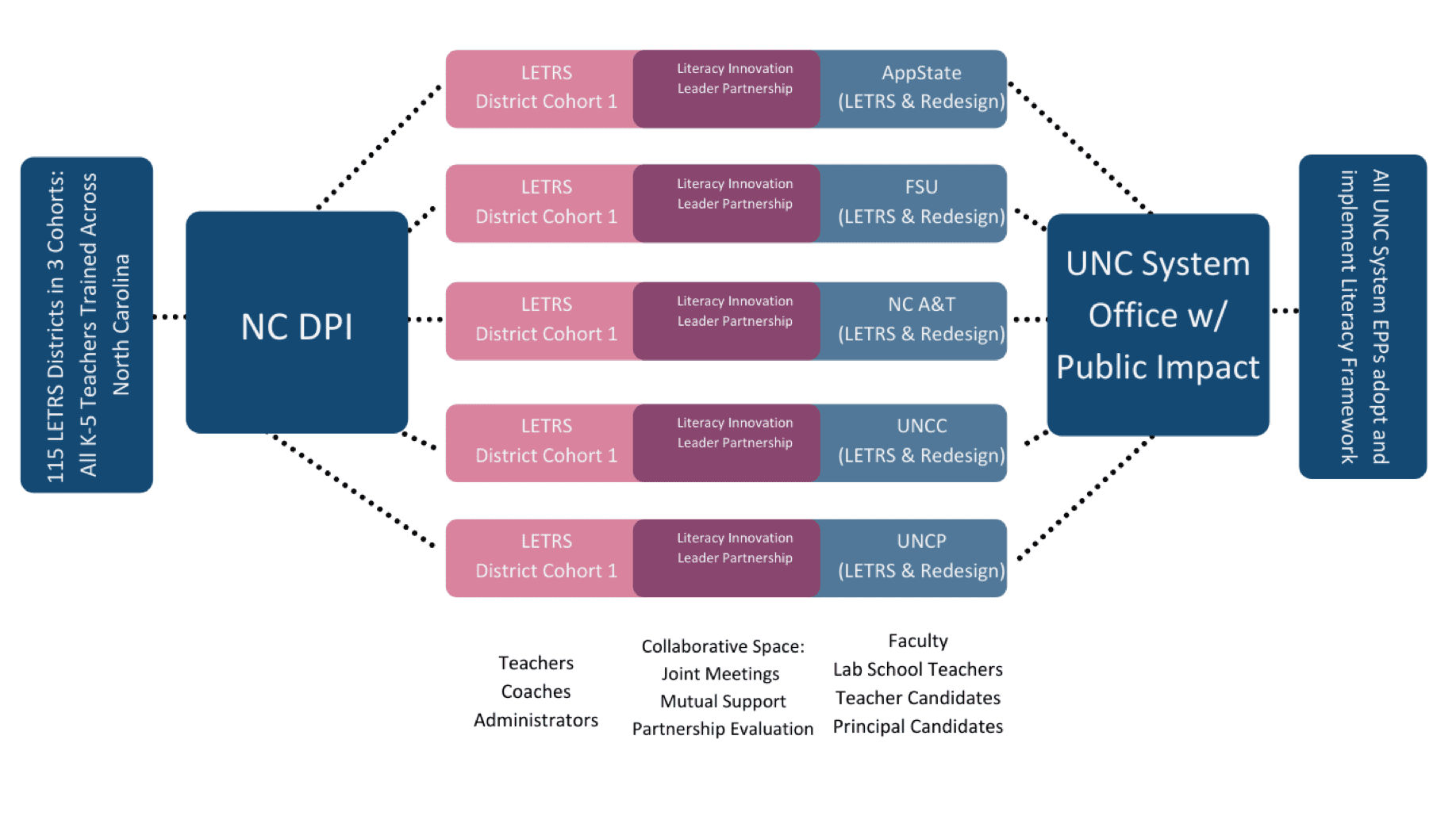Improving Early Literacy Instruction in North Carolina
Growing Momentum
In April 2020, the Board of Governors adopted a Resolution on Teacher Preparation which charged the UNC System Office, in collaboration with educator preparation and literacy experts, to develop a common framework for literacy instruction in teacher preparation that will be adopted by UNC System educator preparation programs (EPPs). The resolution also called on the System Office to identify or create a professional development model that incorporates evidence-based literacy research and practice.
In June 2020, the North Carolina State Board of Education Literacy Task Force presented recommendations that proposed alignment of educator preparation programs with evidence-based literacy research, and noted the need for high quality professional development for in-service teachers in the science of reading.
In February 2021, the UNC System Literacy Framework was released after eight months of development by a team of eight Literacy Fellows drawn from across our constituent universities. The Framework centers on a set of core competencies and sub-competencies and includes detailed implementation guidance for EPPs. The Framework has been distributed to the UNC System educator preparation programs who are now working on a self-study to determine their alignment with the framework. As part of that self-study, each EPP will create an action plan for integrating the framework into their elementary and special education general curriculum programs.
In early February, the new NCDPI superintendent launched her vision for improving literacy by sharing the department’s goal as a shift from a one-by-one approach focused on struggling readers to a systematic plan for training teachers in the science of reading. Over the next two years, DPI seeks to train PreK-3 teachers using the Language Essentials for Teachers of Reading and Spelling (LETRS) training package, and has presented this as a legislative budget priority.
In March 2021, the General Assembly passed a COVID relief package that appropriated $12 million in funding to implement the LETRS professional development program for teachers in low-performing schools. Additional efforts to integrate the Science of Reading into state statute are also underway.
Coordination and Integration
In short, momentum is building across state policymakers and education agencies toward making a leap in evidence-based reading instruction over the next two years. Now the focus must shift to implementation, coordination, and evaluation of these different efforts such that the two primary agencies—the Department of Public Instruction (DPI) and University of North Carolina System—work together in complementary ways that reflect each agency’s core competency. While the UNC System Office had proposed to deliver LETRS training to in-service teachers in the fall, the rapid momentum toward a much larger pilot funded by the General Assembly has led to a series of conversations with the Department of Public Instruction about how to complement one another.
One explanation for the progress made in Mississippi is their emphasis on combining teacher preparation reforms with professional development for teachers to fundamentally change the way reading is taught statewide. We believe that the General Assembly’s investment of $12 million and the generous support of the Spangler and Goodnight Education foundations have created an opportunity to implement a similar combination here. By coordinating our respective efforts to train in-service teachers in the Science of Reading (DPI) and integrate the Science of Reading into our teacher preparation programs (UNC) in a subset of target districts, we will create an inaugural cohort of “Literacy Innovation Leaders”—EPP-LEA partnerships that can serve as test-beds for these ideas in North Carolina. Evaluation of those test-beds can then inform subsequent expansion of this effort.
Specifically, the UNC System Office selected five EPPs that are located in or have close partnerships with districts that DPI chooses to include in the first cohort as recipients of LETRS training under the $12 million pilot. The following EPPs will serve as Literacy Innovation Leaders:
- Appalachian State University
- Fayetteville State University
- N.C. A & T
- UNC Charlotte
- UNC Pembroke
Each EPP will serve as an inaugural Literacy Innovation Leader and engage in a set of activities designed to prepare more teachers in the Science of Reading, including:
- Resources and technical assistance for EPPs to redesign curriculum, courses, and/or field placements to align it with the UNC Literacy Framework, led by key faculty and staff at the EPP and facilitated by a third-party organization with experience in teacher preparation reform;
- Free LETRS training and a stipend for:
- EPP faculty
- lab school teachers
- pre-service teacher and principal candidates from the selected EPPs who would be placed into the partner LEA for clinical field experiences, and potentially post-graduation employment
- Hosting partnership events and professional learning communities around the science of reading
The ultimate goal of the Literacy Innovation Leader (LIL) initiative is to create synergy between education partners to address the continuum of educator preparation and development. This collaboration of critical friends offers the opportunity to positively impact EPPs, teacher and principal candidates, and LEAs to improve student achievement in reading.
